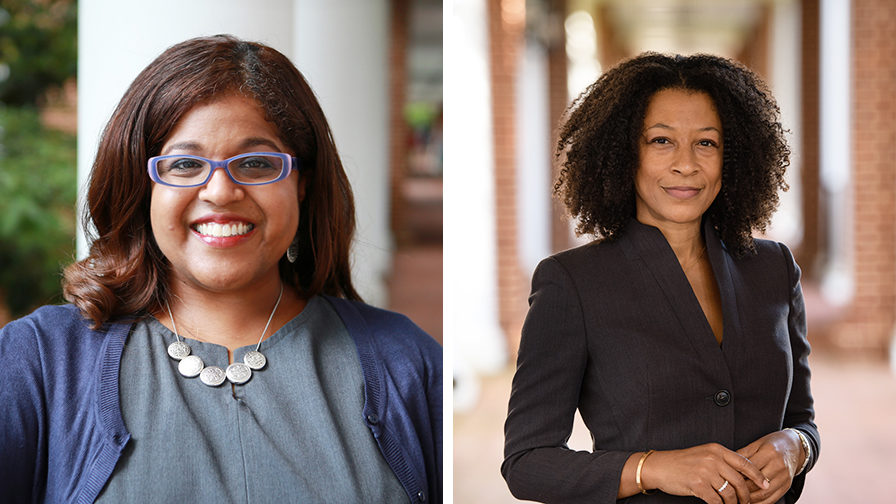
UVA Darden Professors Discuss Obstacles and Achievements at Racial Equity Speaker Series Event
By Dave Hendrick
Two professors at the University of Virginia Darden School of Business recently shined a light on the immense achievements, despite seemingly insurmountable obstacles, of Black women at UVA and in the broader business landscape.
Speaking at a UVA Racial Equity Speaker Series event, Beating the Odds: Black Women and Leadership Legacies, Professors Laura Morgan Roberts and Toni Irving highlighted women who “show up and play to win and then change the game,” even when facing a workplace where the “deck is stacked and the terrain is fraught.”
Regarding the terrain, Roberts cited the findings from her research examining the career paths for 1,400 Black alumni of the Harvard Business School. A significant number, 92 of the 1400, were self-employed or sole proprietors of businesses, with many expressing frustration at an inability to thrive in unwelcoming corporate environments.
Black women, in particular, noted the barriers based on gender and race, with some noting the constant awareness of not coming across as “too assertive,” lest they be tagged as “angry.”
Roberts said many of the 67 HBS Black female graduates who had reached the C-suite discussed feeling “hyper visible” with respect to identity but “invisible with respect to potential.” When given leadership assignments, they were often of the “glass cliff” variety, with a high risk of failure and few safety nets in place.
Roberts’ research showed the way in which the “lean in” ethos of recent years, which posited that women who desired leadership roles simply “need to go for it,” failed to account for the realities of an often stratified workplace. Black women are actively “leaning in” for leadership roles, Roberts said, but are still frequently met with a lack of recognition and reward.
Women who beat the odds and found great success typically found an “authentic style that worked for them,” using a formula that Roberts described as balancing authenticity with emotional intelligence and agility that let them be resilient.
Roberts, who edited the 2019 book Race, Work, and Leadership: New Perspectives on the Black Experience, said Black women also butted up against “the brand” or the popular perception of what leadership looked like.
“When evaluating leadership prototypes, people think white male, and that affects how you evaluate people’s performance as leaders,” said Roberts.
Taking questions from a pan-University group of attendees, Roberts and Irving offered strategies to aid professional growth. Irving, who teaches a course at Darden called “Getting in the Room Where It Happens,” encouraged students to be serious about sponsorship and mentorship, and encouraged women to find a sponsor who would “represent you when you are not present.” Roberts said young professionals should “look for green lights” and find the one or two people in an office who are interested in developing a meaningful professional relationship and can offer candid advice and potentially open doors in the future.
Roberts, who, along with Irving, is a UVA undergraduate alumna, also highlighted a wide range of Black women associated with UVA who were trailblazers and pacesetters, including Isabella Gibbons, an enslaved laborer at the University who became a teacher for decades in Charlottesville post-emancipation; Carla Williams, the first Black female athletic director at a school in a Power 5 conference; and Sylvia Terry, who served as associate dean of the Office of African-American Affairs for nearly three decades.
Roberts, who can trace family history at UVA back to the mid-19th century, when an ancestor named Reuben Barber was a 17-year-old “free working man” at one of the hotels on Grounds, said she chose to come to UVA because of what she perceived as a “history of advancing Black leaders.”
“The opportunity to lead right here on Grounds, that was monumental,” said Roberts, adding that the leadership roles she and her peers took on as undergraduates helped them “grow confident with our ideas and voice.”
Said Irving: “At UVA, this whole idea of student self-governance is so empowering. It tells you that you don’t need to wait, that you can go out and make the world that you want to have.”
In 2020, Roberts and Irving helped lead the free, online course: “Foundations of Diversity, Equity and Inclusion at Work.”
The University of Virginia Darden School of Business prepares responsible global leaders through unparalleled transformational learning experiences. Darden’s graduate degree programs (MBA, MSBA and Ph.D.) and Executive Education & Lifelong Learning programs offered by the Darden School Foundation set the stage for a lifetime of career advancement and impact. Darden’s top-ranked faculty, renowned for teaching excellence, inspires and shapes modern business leadership worldwide through research, thought leadership and business publishing. Darden has Grounds in Charlottesville, Virginia, and the Washington, D.C., area and a global community that includes 18,000 alumni in 90 countries. Darden was established in 1955 at the University of Virginia, a top public university founded by Thomas Jefferson in 1819 in Charlottesville, Virginia.
Press Contact
Molly Mitchell
Associate Director of Content Marketing and Social Media
Darden School of Business
University of Virginia
MitchellM@darden.virginia.edu




